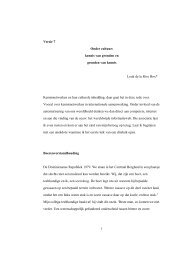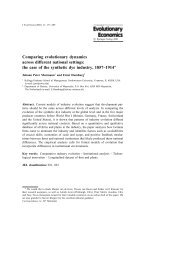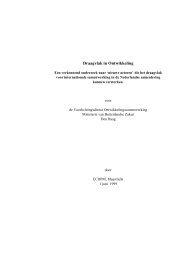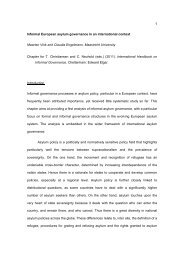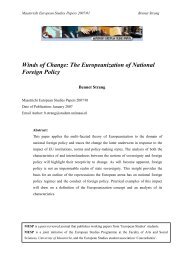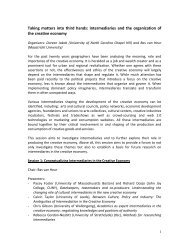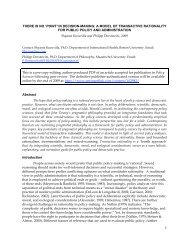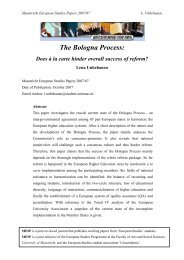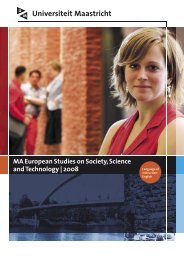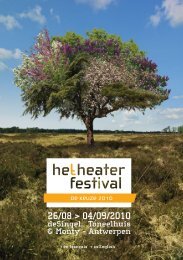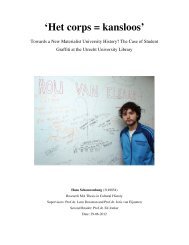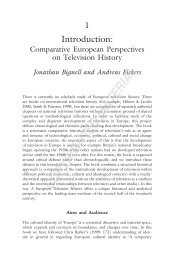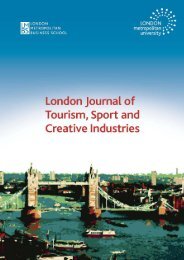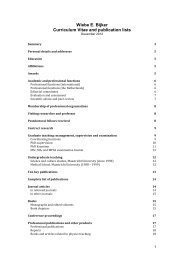Crossing the divide: - Maastricht University
Crossing the divide: - Maastricht University
Crossing the divide: - Maastricht University
Create successful ePaper yourself
Turn your PDF publications into a flip-book with our unique Google optimized e-Paper software.
Prelude 1<br />
<strong>Crossing</strong> <strong>the</strong> <strong>divide</strong>:<br />
<strong>the</strong> precious art of science and technology policy dialogue<br />
Louk Box<br />
When <strong>the</strong> first US envoy to Japan presented his credentials to <strong>the</strong> Imperial Court,<br />
two interpreters were present: one to translate English into Dutch, and <strong>the</strong> o<strong>the</strong>r one<br />
from Dutch into Japanese. Why? Japan had chosen Dutch as its preferred foreign<br />
scientific language in <strong>the</strong> preceding century. Dutch provided a window on <strong>the</strong> world<br />
of contemporary science, just as Latin had done so before in Europe. Japanese<br />
doctors were sent to <strong>the</strong> Ne<strong>the</strong>rlands to get advanced medical training, and so were<br />
people from o<strong>the</strong>r disciplines. 2 A dialogue was started between Japanese and Dutch<br />
scientists, which would last for over 300 years.<br />
When I recently interviewed Professor Bredekamp, <strong>the</strong> South African expert on <strong>the</strong><br />
Khoisan and a member of that ethnic community, he informed me that he had<br />
enjoyed <strong>the</strong> collaboration with a Dutch institute in a study on <strong>the</strong> Khoisan Revival<br />
Movement. They were partners in Sanpad, <strong>the</strong> South Africa–Ne<strong>the</strong>rlands Research<br />
Programme on Alternatives in Development. I was surprised to learn that a Dutch<br />
research institute had contributed to a study of members of this community, formerly<br />
known as Bushmen and Hottentots. 3 On <strong>the</strong> basis of a structured dialogue between<br />
South African and Dutch scientists a research agenda was set, which –among o<strong>the</strong>r<br />
projects – led to <strong>the</strong> one between Bredekamp and his Dutch colleague.<br />
Why refer to <strong>the</strong>se stories? Because, in a way, <strong>the</strong> relations with Japan formed <strong>the</strong><br />
start of sustained Dutch bilateral cooperation programmes in science and<br />
technology. Granted, <strong>the</strong>re were many exchanges in science and technology in <strong>the</strong><br />
17th and 18th centuries; <strong>the</strong> world of science was <strong>the</strong>n as open as it is now,<br />
possibly even more so.<br />
The relationship with South Africa was for me <strong>the</strong> most recent indication of a<br />
productive bilateral scientific cooperation programme. It is part of an explicit science<br />
and technology policy by one donor. As such it aims at bridging, or crossing <strong>the</strong><br />
technological and scientific <strong>divide</strong> and is based on a structured policy dialogue.<br />
In this paper I argue that scientific and technological cooperation between East and<br />
West, or North and South as we presently call it, needs such structured dialogue. I<br />
argue that such dialogue needs to be based on <strong>the</strong> recognition of historical<br />
differences between <strong>the</strong> countries involved. Much cooperation has older roots than<br />
is commonly assumed. I shall argue this for <strong>the</strong> case of The Ne<strong>the</strong>rlands, but <strong>the</strong><br />
same could be argued for o<strong>the</strong>r countries in Europe.<br />
Second, I wish to extend <strong>the</strong> notion of structured dialogue to include a particular<br />
category of actors, which have received too little attention: <strong>the</strong> laymen, <strong>the</strong><br />
dilettantes or practitioners who play a significant role in particular knowledge<br />
networks.<br />
Thirdly I wish to make an argument for institutionalising <strong>the</strong> participation of <strong>the</strong><br />
various actors in policy dialogues, embedded in <strong>the</strong> local organisational context.
Such policy dialogues prove to be effective platforms for consensus building and<br />
technology agenda setting.<br />
I close with some conceptual observations regarding <strong>the</strong> need for extending <strong>the</strong><br />
conceptual work by Gibbons c.s. and propose that a third mode of knowledge<br />
generation be considered, which is based on networks which mediate local<br />
knowledge and thus allow for a real dialogue between <strong>the</strong>ory and practice. I argue<br />
in favour of extending some common notions in <strong>the</strong> field of Science and Technology<br />
Studies into <strong>the</strong> policy practice. The notion of structured policy dialogue provides a<br />
valuable link.<br />
The long history of techno-cooperation: <strong>the</strong> Dutch case<br />
The relation between Japan and The Ne<strong>the</strong>rlands, referred to at <strong>the</strong> outset, did not<br />
stand by itself. The Dutch were also <strong>the</strong> first in Europe to establish a colonial<br />
Society of Arts and Sciences in Batavia, <strong>the</strong> capital of <strong>the</strong> Ne<strong>the</strong>rlands Indies<br />
(Bataviaasch Genootschap van Kunsten en Wetenschappen) in 1778. That was six<br />
years before <strong>the</strong> British established an Asiatic Society of Bengal.<br />
Ano<strong>the</strong>r ‘first’ was <strong>the</strong> establishment of <strong>the</strong> Colonial Institute (now: KIT) in 1850, well<br />
ahead of <strong>the</strong> Scientific and Practical Department of <strong>the</strong> London Imperial Institute in<br />
1894 (Gaillard 1999: 268-269). Wageningen <strong>University</strong> was created in <strong>the</strong> end of<br />
<strong>the</strong> 19th century among o<strong>the</strong>r things, to build capacity for tropical agriculture (not: in<br />
<strong>the</strong> tropics). Until <strong>the</strong> 1940s Leiden <strong>University</strong> boasted a strong colonial<br />
administration department (not: to build local capacity).<br />
The tropical roots of <strong>the</strong>se institutions go deep into Dutch colonial history. In this<br />
way, centres of knowledge about <strong>the</strong> tropics emerged in cities like Amsterdam,<br />
Leiden and Wageningen. The same occurred in o<strong>the</strong>r cities in <strong>the</strong> 19 th century. The<br />
reason was generally commercial, and became increasingly <strong>the</strong> basis for governing<br />
<strong>the</strong> colonial empire. Yet <strong>the</strong> consequences were that small knowledge centres<br />
emerged, which linked tropical realities in <strong>the</strong> fields of agronomy and forestry, law,<br />
medicine, and subsequently economics and sociology to <strong>the</strong> respective disciplines<br />
in <strong>the</strong> metropolis. Some of <strong>the</strong>se centres (like Wageningen) would not have existed<br />
now, had it not been for <strong>the</strong>ir tropical basis. The same could be argued for<br />
comparable centres of knowledge in o<strong>the</strong>r countries, like Gembloux in Belgium.<br />
All of this is largely forgotten, yet it illustrates one small country’s long history of<br />
involvement in tropical research. Cooperation in science between East and West or,<br />
as we presently say North and South, <strong>the</strong>refore has a respectable history. With <strong>the</strong><br />
demise of colonialism in <strong>the</strong> aftermath of <strong>the</strong> Second World War, a discontinuity<br />
appears to have occurred with <strong>the</strong> mergence of technical assistance programmes<br />
under a new phenomenon, referred to as development cooperation.
This development cooperation was rooted in many different soils, older and younger<br />
ones. It emerged from <strong>the</strong> immediate post-World War II programmes of<br />
reconstruction and development in Europe and North America. Inspired by Truman’s<br />
‘Point Four’ of 1949, a singular mix was proposed involving transfer of know-how<br />
and technology. Truman announced a “bold new program for making <strong>the</strong> benefits of<br />
our scientific advances and industrial progress available for <strong>the</strong> improvement and<br />
growth of underdeveloped areas” (Ponsioen 1968: 52).<br />
Bold it was, and lasting would be its effects. Not only in ‘underdeveloped areas’ but<br />
also in <strong>the</strong> policies and programmes of <strong>the</strong> countries that would become known as<br />
<strong>the</strong> ‘developed’, <strong>the</strong> ‘industrialised’, <strong>the</strong> North, <strong>the</strong> donors or simply <strong>the</strong> ‘rich’. The<br />
assumption was simple: countries are developed because <strong>the</strong>y are scientifically<br />
advanced and <strong>the</strong>refore industrialised. Underdeveloped countries lack knowledge<br />
and <strong>the</strong>refore that knowledge needs to be transferred first. 4<br />
There is much to be said for <strong>the</strong> simplicity of <strong>the</strong> model. After all, <strong>the</strong> so-called<br />
underdeveloped countries had generally been colonies of <strong>the</strong> European powers that<br />
had not created what we would now call a ‘knowledge base’. On <strong>the</strong> contrary, almost<br />
all higher education and scientific research was concentrated in <strong>the</strong> metropolis.<br />
Some applied research did occur, especially in tropical agriculture, focusing on<br />
particular crops like cotton, coffee, cacao, rubber and tea. Since <strong>the</strong>se colonies had<br />
been starved of ‘scientific advance’, it was logical for Truman to assume that <strong>the</strong> gap<br />
needed to be closed by a transfer of scientific knowledge to allow for ‘industrial<br />
progress’.<br />
This was <strong>the</strong> context for <strong>the</strong> start of development cooperation, as we presently know<br />
it. In October 1949, <strong>the</strong> Ne<strong>the</strong>rlands was one of <strong>the</strong> first donors in <strong>the</strong> world to follow<br />
Truman’s lead. Interestingly, it took <strong>the</strong> form of support to <strong>the</strong> United Nations’<br />
Expanded Programme for Technical Assistance. The motivation was ra<strong>the</strong>r selfcentred.<br />
Dutch aid would serve a national economic interest because it allowed<br />
Dutch scientists and entrepreneurs new opportunities for exporting knowledge and<br />
products. In addition, it might enhance international prestige. Last (but certainly not<br />
least), it could provide work for <strong>the</strong> many colonial engineers who had been<br />
unemployed since Indonesia became independent (Malcontent and Nekkers 1999:<br />
12). The conclusion must be that <strong>the</strong> genesis of Dutch aid was couched in Dutch<br />
interests, including scientific and technological interests, articulated through US<br />
policy priorities. What could be more logical than to transfer that ‘unemployed<br />
expertise’ to countries that apparently needed it?<br />
The Dutch case was no exception. Ponsioen (1968: 57) notes: “if development<br />
assistance was new in 1949, it suddenly was present in 1950 <strong>the</strong> world over”. It was<br />
generally assumed that knowledge was abundantly available in <strong>the</strong> developed<br />
countries and that sending experts to, or training students from, <strong>the</strong> developing<br />
countries could do <strong>the</strong> job. This assumption was confirmed by leading <strong>the</strong>oreticians<br />
of <strong>the</strong> time, <strong>the</strong> so-called ‘modernists’. The leading ideologist, and author of “a noncommunist<br />
manifesto”, argued that countries first needed to pass a stage of ‘take off<br />
to self-sustaining growth’ (Rostow 1960). Not surprisingly, he argued for technical<br />
assistance. In o<strong>the</strong>r words: modernisation and technology transfer were two sides of<br />
<strong>the</strong> same coin. Modernisation <strong>the</strong>ory provided <strong>the</strong> rationale for this particular form of<br />
aid.
Quite soon, however, <strong>the</strong> model proved to be dead wrong. Experiences in <strong>the</strong> early<br />
1950s showed that “<strong>the</strong> technical knowledge, required in tropical countries, was not<br />
available in <strong>the</strong> West, or at least not ready for its application in o<strong>the</strong>r than Western<br />
conditions” (Ponsioen 1968: 60). Never<strong>the</strong>less, <strong>the</strong> technology transfer model<br />
continued to inspire aid or cooperation policies for decades to come. A model that<br />
was outdated at <strong>the</strong> outset was to inspire generations of policymakers, scientists<br />
and technologists, be <strong>the</strong>y diplomats of <strong>the</strong> 1940s, industrial engineers in <strong>the</strong> 1950s,<br />
or biotechnologists in <strong>the</strong> 21st century. Was Claude Alvares, <strong>the</strong> Indian writer with a<br />
deep mistrust of <strong>the</strong> ‘modern knowledge industry’ right, when he compared science<br />
with toothpaste, and dismissed <strong>the</strong>m both as ‘irrelevant to life’?<br />
Why recount this early history? Because it shows how scientists and technologists<br />
have been involved from <strong>the</strong> very start in <strong>the</strong> shaping of official development aid or<br />
technical assistance: <strong>the</strong>y had a stake in it (as unemployed experts in Europe) and<br />
<strong>the</strong>y helped shape its rationale or <strong>the</strong>ory (as in Rostow’s work). Both <strong>the</strong> older<br />
history (<strong>the</strong> creation of institutes and universities in <strong>the</strong> 19 th Century) and <strong>the</strong> more<br />
recent one just mentioned, need to be understood before a structured dialogue can<br />
take place.<br />
Scientific interest has <strong>the</strong>refore closely interacted with <strong>the</strong> rationale for technical<br />
assistance. Rostow’s modernisation <strong>the</strong>ory provided a basis for technology transfer,<br />
and made for a very special type of donor support that suited particular interests.<br />
Claude Alvares (1997: 294) has attacked <strong>the</strong>se unholy alliances between science<br />
and <strong>the</strong> state, as imposing an element of Western culture over poor countries.<br />
I, however, do not subscribe to a conspiracy <strong>the</strong>ory, which argues that scientists<br />
from developed countries only saw it as being in <strong>the</strong>ir interest to provide this type of<br />
aid. Aid has always had too many interests or motivations associated with it to just<br />
link it to one interest group.<br />
I would point out, however, that a close relation has existed between science and<br />
development aid from <strong>the</strong> very start in <strong>the</strong> late 1940s, and that a <strong>the</strong>oretical model<br />
was adopted in which science was accorded a special place in <strong>the</strong> development<br />
process. The model continued to be operative, even though its faults soon became<br />
evident. In o<strong>the</strong>r words: Nor<strong>the</strong>rn scientists had a significant role in <strong>the</strong> setting of<br />
developmental priorities, especially in <strong>the</strong> area of scientific and technological<br />
cooperation. O<strong>the</strong>r actors were poorly represented in <strong>the</strong> agenda setting. A policy<br />
dialogue, which seriously involved actors from <strong>the</strong> South, was slow in <strong>the</strong> coming.<br />
Where do we stand now? The Human Development Report argues “Technology<br />
networks are transforming <strong>the</strong> traditional map of development, expanding people’s<br />
horizons and creating <strong>the</strong> potential to realise in a decade progress that required<br />
generations in <strong>the</strong> past”. The report links technological transformation to<br />
globalisation and concludes that toge<strong>the</strong>r <strong>the</strong>y are creating a new paradigm: <strong>the</strong><br />
network age (UNDP 2001: 27). Whose networks?
Formal science and informal knowledge networks<br />
Much of <strong>the</strong> knowledge that is required<br />
for successful development<br />
is not patentable.<br />
Joseph Stiglitz (1999: 318)<br />
This globalisation of <strong>the</strong> market for knowledge requires a different model of<br />
technological cooperation based on knowledge networks. What is <strong>the</strong> relation<br />
between formal science and technology development in North South international<br />
cooperation?<br />
It has been argued that “a fundamental reversal in <strong>the</strong> dynamics of technology<br />
transfer” is taking place, with <strong>the</strong> result that “industrialisation and economic growth<br />
can take place without a sound scientific basis” (Feil 1994: 446-47). A ‘de-linking’ of<br />
technology production and consumption occurs through <strong>the</strong> activities of<br />
transnational companies making deals with local affiliates. These deals can take <strong>the</strong><br />
form of joint ventures, mergers and acquisitions and may have benefits for <strong>the</strong> poor<br />
country in question - but only in <strong>the</strong> short run. The sustainability of such ventures is<br />
likely to be low, as Mytelka (1998: 13) has shown. “Sustainable scientific research<br />
without close links to technology is just as unlikely as growth of advanced<br />
technology without a scientific basis” (Feil 1994: 447). The need for close links<br />
between technology development and scientific advance appears <strong>the</strong>refore to be<br />
well established.<br />
The general question <strong>the</strong>refore needs to be asked if formal science is relevant to<br />
technology development to solve problems in poor tropical countries. Take <strong>the</strong> case<br />
of medicine: of <strong>the</strong> 1223 drugs marketed worldwide between 1975 and 1996, only<br />
1% (13) were developed to treat tropical diseases. Out of <strong>the</strong> 95,000 articles<br />
published in medical journals in 1995, only one-fifth of one percent (182) dealt with<br />
tropical diseases. Out of <strong>the</strong> global spending on health research, only one-fifth of<br />
one percent concerned pneumonia and diarrhoea, which toge<strong>the</strong>r account for 11%<br />
of <strong>the</strong> global disease burden, especially in poor countries (UNDP 2001). This is <strong>the</strong><br />
case for medicine, but in environmental science <strong>the</strong> situation is not likely to be much<br />
better.<br />
The problem is aggravated by <strong>the</strong> perceived irrelevance of traditional science,<br />
especially in many African countries. Paulin Hountoundji, a respected African<br />
philosopher, calls this ‘mimetism’ or an extreme attentiveness ‘to <strong>the</strong> intellectual fads<br />
of <strong>the</strong> West’. His view is that African research has been “irrelevant” for two reasons.<br />
“One was <strong>the</strong> oppositional stance of most African intellectuals and <strong>the</strong>ir<br />
unwillingness to be ‘usable’. [...] The second, and more serious problem was<br />
whe<strong>the</strong>r our basic research really addressed <strong>the</strong> key issues and whe<strong>the</strong>r, when it<br />
borrowed concepts, it was sufficiently sensitive to <strong>the</strong> specific of our own conditions”<br />
(cited in Mkandawire 2000: 211).<br />
All in all, this is quite an indictment of traditional science: it is perceived as largely<br />
irrelevant, and when relevant it might exacerbate <strong>the</strong> cleavages between rich and<br />
poor.
Towards a new approach: is local knowledge <strong>the</strong> answer?<br />
The subsequent question is <strong>the</strong>refore: is <strong>the</strong> type of knowledge that modern science<br />
produces to blame for this? Could it be that ano<strong>the</strong>r type of knowledge would be<br />
more relevant to <strong>the</strong> needs of <strong>the</strong> poor in poor countries and produce less<br />
inequalities as just signalled? This is a question that has increasingly occupied<br />
social scientists, especially those interested in <strong>the</strong> questions raised by Claude<br />
Alvares and o<strong>the</strong>rs.<br />
The knowledge network approach advocated in <strong>the</strong> Human Development Report<br />
assumes an appreciation for joint learning. Joint learning means: common<br />
authorship of <strong>the</strong> insights obtained. Some examples may clarify this point.<br />
• When Dutch soil scientists in Vietnam discovered a certain type of soil<br />
deterioration, <strong>the</strong>y described it and were <strong>the</strong> first to publish <strong>the</strong> findings.<br />
When I asked how <strong>the</strong>y had found out about <strong>the</strong> phenomenon, it became<br />
clear <strong>the</strong>y had followed a farmer’s clue about <strong>the</strong> process. They had<br />
described <strong>the</strong> process, not discovered it. Was <strong>the</strong> farmer’s name included<br />
among <strong>the</strong> authors of <strong>the</strong> publication?<br />
• When a Dominican plant pathologist discovered <strong>the</strong> incidence of a blue<br />
mould on tobacco in <strong>the</strong> late 1970s, peers and <strong>the</strong> public widely (and rightly)<br />
hailed her. When I asked how she had found out about it, she acknowledged<br />
<strong>the</strong> clues she had received from <strong>the</strong> growers. She had ‘certified’ <strong>the</strong> disease,<br />
but had not discovered it.<br />
These examples are indicative of a more general phenomenon: how to acknowledge<br />
<strong>the</strong> contribution of non-professional scientists to such knowledge networks? In<br />
traditional science <strong>the</strong> case is simple: <strong>the</strong> scientist or group of scientists who first<br />
publish can claim primacy. The technologist who first patents an invention can claim<br />
<strong>the</strong> proceeds. In <strong>the</strong> emerging mode of knowledge production this becomes much<br />
more complicated. Especially for <strong>the</strong> type of knowledge that is <strong>the</strong> subject of<br />
international cooperation arrangements.<br />
This problem needs to be tackled for both pragmatic and ethical reasons. If science<br />
is not a world to itself any more and involves non-professionals, <strong>the</strong>n <strong>the</strong>se nonprofessionals<br />
have a right to profit from <strong>the</strong> prestige or <strong>the</strong> profits. This argument<br />
applies to <strong>the</strong> soil scientist in Vietnam, but also to <strong>the</strong> pharmaceutical company that<br />
has engaged in ‘gene hunting’ (Juma 1989) and has appropriated a particular<br />
substance through <strong>the</strong> involvement of tropical farmers.<br />
It is striking to note how little formal science has acknowledged <strong>the</strong>se types of<br />
insights, which are often gained through informal knowledge networks. The<br />
phenomenon has been well known throughout <strong>the</strong> history of science; <strong>the</strong> distinction<br />
between ‘scientist’ and ‘dilettante’ being a fairly recent one. The word ‘scientist’ was<br />
first used in English as an analogy to <strong>the</strong> word ‘artist’ in 1834; dilettante is somewhat<br />
younger and stems from 1748 (Webster’s Dictionary).<br />
Learned societies would have both categories among <strong>the</strong>ir membership, and<br />
stimulate <strong>the</strong>ir scientific curiosity. Anne Secord (1994: 408) studied <strong>the</strong> contributions<br />
of so-called artisan-entomologists, zoologists and botanists in early 19th-century
Britain. She shows that <strong>the</strong>se artisans, or workingmen, had extensive<br />
correspondence networks. Their letters provide “tangible evidence of <strong>the</strong>ir scientific<br />
skill and signalled acceptance by a wider community of <strong>the</strong>ir right to practice natural<br />
history”. With <strong>the</strong> professionalisation of science, distancing has occurred between<br />
<strong>the</strong> two categories. Therefore, <strong>the</strong> role of <strong>the</strong> non-professional in discovery and<br />
invention may have become less and less recognised.<br />
Yet, <strong>the</strong> trend may be reversed, for various reasons. In rich countries an ever-larger<br />
part of <strong>the</strong> population has followed higher education, thus contributing to a<br />
democratisation of science and scientific knowledge. In many fields of scientific<br />
endeavour <strong>the</strong> role of <strong>the</strong> non-professional has continued, or has increasingly been<br />
acknowledged. In archaeology <strong>the</strong> role of <strong>the</strong> amateur has been extensively<br />
debated, as well as in fields such as astronomy, history (especially local history),<br />
botany and plant breeding. In ongoing phenological research on <strong>the</strong> effects of<br />
climate change on flora and fauna in <strong>the</strong> Ne<strong>the</strong>rlands, for example, <strong>the</strong> principal<br />
researcher has requested <strong>the</strong> audience of a popular radio programme to report <strong>the</strong><br />
first sighting of a plant or animal in a given season. The research profits from <strong>the</strong><br />
vast network of lay informants or observers who provide a wealth of information. 5<br />
In poor countries, local informants have become a recognised part of research<br />
teams. Take <strong>the</strong> case of <strong>the</strong> huge natural inventory compiled by researchers from<br />
<strong>the</strong> Merck Company in Costa Rica, where local farmer informants were formally<br />
included in <strong>the</strong> teams (Brush 1998). Their knowledge was recognised in subsequent<br />
publications. The research would have been impossible without <strong>the</strong>se trained lay<br />
informants.<br />
In Africa, “recent studies point to <strong>the</strong> existence of rich indigenous scientific<br />
knowledge in many parts of <strong>the</strong> region. [...] The region’s Materia medica of more<br />
than 1000 animal, plant and mineral products for <strong>the</strong> treatment of illness is a<br />
resource that Western-trained scientists are widely studying. […] The challenge<br />
seems to be how to integrate this African indigenous knowledge [...] into mainstream<br />
analytical science” (Bass, quoted in Adeboye 1998: 177–178).<br />
The success of <strong>the</strong>se approaches lies in <strong>the</strong> careful linkage of a fairly traditional<br />
(possibly even disciplinary) knowledge with user (or practitioner) knowledge. The<br />
recognition of user knowledge is <strong>the</strong> key to its sustainability (Brush 1998: 764). The<br />
resulting knowledge network can be remarkably dynamic, as <strong>the</strong> Costa Rican and<br />
South African cases illustrate. It made good commercial sense to a transnational<br />
company like Merck – just as it made good scientific sense to <strong>the</strong> researchers<br />
involved.<br />
We could take this one step fur<strong>the</strong>r, as Stiglitz does when he argues in favour of<br />
due recognition of a ‘global knowledge commons’. The maintenance of such a<br />
global commons and <strong>the</strong> financial implications, need to be formally recognised. “The<br />
international community could similarly claim <strong>the</strong> right to charge for <strong>the</strong> use of <strong>the</strong><br />
global commons” (Stiglitz 1999: 316). This is <strong>the</strong> crux of <strong>the</strong> matter: <strong>the</strong> knowledge<br />
networks that could form <strong>the</strong> base for a new division of labour in knowledge<br />
production will need to settle <strong>the</strong> matter of public versus private goods. Once that is<br />
clear, recognition of contributions to and claims on this knowledge can be arranged.
This is <strong>the</strong> more important, since “much of <strong>the</strong> knowledge that is required for<br />
successful development is not patentable” (Stiglitz 1999: 318; see also Brush 1998).<br />
It is all <strong>the</strong> more surprising that <strong>the</strong>re is so little empirical study of this phenomenon.<br />
What makes for a productive research dialogue between professionals and<br />
practitioners? How is tacit knowledge codified in <strong>the</strong> teams? Who needs to be<br />
trained in what type of skills? How was <strong>the</strong> contribution of practitioners recognised?<br />
I have not been able to locate comparative analyses on such practitionerprofessional<br />
collaboration. There are <strong>the</strong> mentioned historical studies on <strong>the</strong><br />
subject, and materials from agriculture and <strong>the</strong> environment, but no comparative<br />
studies. 6 Authors like Gibbons (1994) and Chambers (1989; 1997; see also<br />
Scoones 1994) have argued that <strong>the</strong> very nature of knowledge production in rich<br />
countries made it inapplicable among <strong>the</strong> poor elsewhere. Especially in <strong>the</strong><br />
agricultural sciences, <strong>the</strong>se arguments have been made and have led to a<br />
blossoming of different views and <strong>the</strong> proposal of countless approaches and<br />
techniques to overcome this.<br />
I argue, <strong>the</strong>refore, that <strong>the</strong> borderline between so-called formal or professional<br />
knowledge and informal, amateur or indigenous knowledge is large and significant.<br />
Professionals need amateurs, and vice versa. Recognition needs to be organised in<br />
<strong>the</strong> form of practitioner participation in <strong>the</strong> spoils, be <strong>the</strong>y financial or honorary. The<br />
second implication is that <strong>the</strong> amateurs need to be admitted to <strong>the</strong> relevant for a.<br />
Excluding <strong>the</strong>m from <strong>the</strong> dialogue would mean <strong>the</strong> impoverishment of <strong>the</strong> exchange.<br />
Recent work on indigenous knowledge articulation (Brush 1998) indicates how this<br />
can be done.<br />
Gibbons and his colleagues (1994: 1-3) have argued that two modes of knowledge<br />
production can be distinguished. A Mode 1 exists in <strong>the</strong> traditional context of <strong>the</strong><br />
scientific profession, along disciplinary lines, following <strong>the</strong> Newtonian model. It is <strong>the</strong><br />
type of science that Alvares discarded as being largely irrelevant to life, because it<br />
was not rooted in <strong>the</strong> local cultural context.<br />
Contrast this with a new paradigm, or an emerging Mode 2 of knowledge creation.<br />
Gibbons’ team saw this as <strong>the</strong> coming trend. Not global models, but local problems<br />
form <strong>the</strong> starting point. In Alvares’ terms, a mode of knowledge production that is not<br />
associated with a coercive state, but with a supportive community.<br />
The clash between <strong>the</strong>se trends has been fierce. I recall <strong>the</strong> debates in agricultural<br />
science in <strong>the</strong> late 1970s and early 1980s. Mode 1 identified itself as <strong>the</strong> only<br />
science that could help solve major problems like world hunger. It produced a Green<br />
Revolution, which increased food production and rural inequalities at <strong>the</strong> same time.<br />
Mode 2 saw itself as <strong>the</strong> protagonist of <strong>the</strong> poor, solving <strong>the</strong> problems through <strong>the</strong><br />
involvement of ‘<strong>the</strong> people <strong>the</strong>mselves’.<br />
At <strong>the</strong> time I designed an adaptive agricultural research programme involving plant<br />
scientists, soil scientists, economists and social anthropologists. My naive belief<br />
was that <strong>the</strong>re must be a middle road between <strong>the</strong> simplistic rhetoric of <strong>the</strong><br />
disciplinarians, in which reality was reduced to a ma<strong>the</strong>matical model, and <strong>the</strong> naive<br />
idealism of those who reduced reality to indigenous knowledge. After all, <strong>the</strong> poor<br />
farmers we were working with wanted to know solutions from us based on scientific<br />
experiments. They were puzzled when we were interested in <strong>the</strong>ir solutions based
on <strong>the</strong>ir elementary experiments. They might not even recognise <strong>the</strong>ir own<br />
experiments as such, calling <strong>the</strong>m ‘horse play’.<br />
While doing research in <strong>the</strong> Dominican Republic and in Costa Rica, I became<br />
convinced that <strong>the</strong> traditional Mode 1 could not explain reality or provide adequate<br />
insights on how to change it. I also realised that Gibbons’ Mode 1 and Mode 2 types<br />
of knowledge were not just trends, <strong>the</strong>y were ideologies in <strong>the</strong> battle for <strong>the</strong> control<br />
of science. Especially in what was called ‘science for development’, or<br />
‘development-oriented research’.<br />
The modes were ideal types, easily transformed into battle cries. Simplification<br />
occurred. The view of reality could become blurred, especially if <strong>the</strong> views were<br />
translated into policies. Agricultural policies in most poor countries were still based<br />
on <strong>the</strong> premise of formal science and <strong>the</strong> transfer of technology as <strong>the</strong> solution to all<br />
problems. Pressure groups in rich countries and authors like Alvares pointed out<br />
that <strong>the</strong>re were alternatives. Aid donors were caught in <strong>the</strong> middle, and development<br />
research would face radically new approaches in <strong>the</strong> 1990s.<br />
Knowledge networks<br />
While doing <strong>the</strong> research in <strong>the</strong> Caribbean and in Central America, I found transdisciplinarity<br />
to be a noble goal, yet hard to take as a starting point. Most of my<br />
colleagues (national or expatriate) were hard working, well-intentioned professionals<br />
who were committed to general notions of poverty alleviation. They, like me, were<br />
good in only a few things. The Mode 2 ideal of trans-disciplinarity, heterogeneity<br />
and organisational diversity was shared, but as a management goal it proved to be<br />
far harder to implement than expected. 7 Add to this <strong>the</strong> demands of social<br />
accountability, or <strong>the</strong> answer to <strong>the</strong> question: who decides that we are doing <strong>the</strong><br />
right thing in <strong>the</strong> right way? Involving <strong>the</strong> farmers proved to be hard enough; asking<br />
<strong>the</strong>m to evaluate our findings or recommendations was at times impossible.<br />
In Costa Rica we found (Box et al. 1990) that agricultural innovation appeared to be<br />
dependent on <strong>the</strong> nature of knowledge networks involving farmers, researchers and<br />
all those who mediated between <strong>the</strong>m. The idea was associated with studies in rich<br />
countries, which had shown that <strong>the</strong> degree agricultural innovation appeared to be<br />
highly associated with <strong>the</strong> quality of communication between all <strong>the</strong> parties involved<br />
(Engel 1995).<br />
If knowledge networks could prove to be an interesting entry point to understand<br />
and promote technological innovation, it might be an alternative to <strong>the</strong> battle cries of<br />
disciplinary traditional science versus trans-disciplinarian approaches. After all, <strong>the</strong><br />
important factor would not be <strong>the</strong> disciplinary or trans-disciplinary nature, but <strong>the</strong><br />
type of linkages between <strong>the</strong> various participants.<br />
We found an initial confirmation of this complementarity when contrasting <strong>the</strong><br />
relatively open knowledge network in cacao innovation with <strong>the</strong> hermetically sealed<br />
network of banana innovation. The dynamic cacao network involved dialogue<br />
between independent growers, traders, extensionists and (disciplinary) researchers.<br />
Banana innovation was almost exclusively dependent on secret company research
done abroad, which was <strong>the</strong>n passed top-down to <strong>the</strong> contract growers. Disciplinary<br />
approaches could be quite productive in <strong>the</strong> cacao case, provided <strong>the</strong> growers were<br />
linked in <strong>the</strong> knowledge network.<br />
The notion of a knowledge network is <strong>the</strong> key to <strong>the</strong>se modes. I see a network as a<br />
relatively loosely structured form of cooperation, in which coordination is done<br />
through a horizontal exchange of information, lacking a clear hierarchy (see also<br />
Chataway 1999?: 9). It is composed of communication links between individuals or<br />
groups. The network notion stresses <strong>the</strong>se linkages and allows participants to<br />
exchange information and attach meaning to it, thus transforming information into<br />
knowledge. In contrast with <strong>the</strong> dominant Mode 1 type of knowledge production, it<br />
stresses horizontal exchanges of information. In contrast with Mode 2 type of<br />
knowledge production it allows for disciplinary (Mode 1) knowledge generation and<br />
exchanges, as well as trans-disciplinary (problem-oriented) knowledge generation.<br />
I argue <strong>the</strong>refore that <strong>the</strong> current trend appears to be a syn<strong>the</strong>sis of <strong>the</strong> two modes.<br />
Knowledge is not just verified within <strong>the</strong> scientific profession (peer review), or just<br />
falsified on <strong>the</strong> basis of review in <strong>the</strong> context of application or use (user review).<br />
Both systems of quality maintenance are operative. Paul Richards (1994: 166) calls<br />
this type: “knowledge that is in conformity with general scientific principles, but<br />
which, because it embodies place-specific experience, allows better assessments of<br />
[local] risk factors”. For example, cacao breeders in <strong>the</strong> Costa Rican agricultural<br />
research station had to make <strong>the</strong>ir scientific case within <strong>the</strong> community of<br />
professional plant breeders; in <strong>the</strong> knowledge network, users also provided <strong>the</strong>m<br />
with <strong>the</strong> practical validation. It was <strong>the</strong> combination of <strong>the</strong>se two that made for<br />
dynamic innovation.<br />
... knowledge for development goes beyond <strong>the</strong> collection of best<br />
practices and <strong>the</strong> accumulation of successful anecdotes …<br />
why do certain policies and practices work in some circumstances<br />
and not o<strong>the</strong>rs? Thus research is a central element<br />
of knowledge for development.<br />
Stiglitz (1999: 319)<br />
An empirical basis for development policy?<br />
.After a half-century of technical assistance and development cooperation, <strong>the</strong>re<br />
have been precious few empirical studies analysing development-oriented research<br />
cooperation. A recent literature review notes that “... little of <strong>the</strong> material is <strong>the</strong> result<br />
of systematic studies of North–South research partnerships” (Spaapen 1999: 3; 16).<br />
Interviews and searches, which I have recently done in <strong>the</strong> United States, France,<br />
Sweden and <strong>the</strong> Ne<strong>the</strong>rlands, indicate that such a literature is absent; and that<br />
those studies that have been done are generally descriptive, evaluative or<br />
prescriptive. Jacques Gaillard (1999:13; 263), one of <strong>the</strong> best-informed authors on<br />
this subject, writes: “Information in this field is often difficult to obtain [is often partial]<br />
and incomplete”. Wesley Shrum, recently told me (personal communication 2001)<br />
that he has been pleading for such research but could not get it funded.
The lack of insight into donor-supported programmes<br />
Not only do we lack empirical reviews, we also lack solid policy reviews of donorsupported<br />
research. The central bookkeeper of such reviews is <strong>the</strong> Development<br />
Assistance Committee of <strong>the</strong> OECD. It does not include a budget line for resources<br />
committed to research and development (UNDP 2001: 110). These observations are<br />
not new. Lewis (1987) did pioneering work in <strong>the</strong> 1980s and concluded that<br />
international budget comparisons were hard to make. In 1994 a review concluded:<br />
“Efforts to map <strong>the</strong> capacity of development-related research at <strong>the</strong> national level [in<br />
<strong>the</strong> South, LB] continue to be negligible […] Overviews of research funded by<br />
development agencies […] are even more scarce” (Boer and Box 1994: 165).<br />
What do we see from o<strong>the</strong>r data? The World Bank (2000) did a study over 1998-<br />
1999 of some 500 research institutes in developing countries and nine selected<br />
donors 11 . The Report concludes that funding levels are inadequate, research quality<br />
is poor, and policy impact of research is questionable.<br />
In general <strong>the</strong>re has been a gradual decline in support for research and related<br />
capacity building: <strong>the</strong> present level of expenditure compares ra<strong>the</strong>r poorly with that<br />
in <strong>the</strong> late 1980s (see also Gaillard 1999: 54ff). It stands in stark contrast with <strong>the</strong><br />
needs identified in <strong>the</strong> recent Human Development Report, mentioned before. The<br />
recent Danish initiative to bolster research in international cooperation is <strong>the</strong>refore<br />
an exception, ra<strong>the</strong>r than <strong>the</strong> rule (Udenrigsministeriet, 2001).<br />
Even though <strong>the</strong> priority for research in international cooperation may be on <strong>the</strong><br />
decline, <strong>the</strong>se programmes continue to be a relevant source for such research. Take<br />
<strong>the</strong> case of a small country like <strong>the</strong> Ne<strong>the</strong>rlands again. Its total outstanding<br />
commitment to such research is just under 500 million Euros (<strong>the</strong> exact figure being<br />
NLG 926,757,352 (Ministry of Foreign Affairs 2001, personal communication).<br />
In a number of poor countries, such donor funding is just about <strong>the</strong> only funding<br />
available, because <strong>the</strong> national government gives no priority whatsoever to<br />
research. For example, social science research in a middle-income country like<br />
South Africa. It has suffered reduction after reduction, making it increasingly<br />
dependent on donor funding. One donor now funds one-fifth to one-quarter of all<br />
social science research in South African higher education.<br />
Agricultural research in most African countries is almost exclusively donor funded,<br />
even though <strong>the</strong> rate of return is remarkably high (for sub-Saharan Africa 33%, in<br />
general it is even 44%, according to <strong>the</strong> UNDP 2001: p.44; see also p.110).<br />
Why is public funding in rich and poor countries for development oriented research<br />
so low? The Human Development Report makes a damning diagnosis (UNDP 2001:<br />
110-111). It argues that donors and recipients simply do not consider it a priority,<br />
blinded as <strong>the</strong>y are by narrow national priorities. Too many small initiatives make for<br />
fragmented research, <strong>the</strong> results of which are not brought toge<strong>the</strong>r. Donors wish to<br />
score with short-term results and compete among <strong>the</strong>mselves. Recipient<br />
governments may prioritise military expenditures. (UNDP 2001)<br />
The ra<strong>the</strong>r startling conclusion must be that international donor agencies have spent<br />
vast amounts of money on development-oriented research, without adequate
empirical research accompanying this form of international cooperation.<br />
Researchers ei<strong>the</strong>r were not interested, or could not interest funding agencies in<br />
supporting such research. Second, we may conclude that <strong>the</strong> funding agencies have<br />
not been particularly forthcoming in publishing data on <strong>the</strong>ir programmes. Third, we<br />
note that <strong>the</strong> recipient governments, with some notable exceptions, have not been<br />
interested in sponsoring development-oriented research.<br />
O<strong>the</strong>r relevant literature<br />
One word about <strong>the</strong>se novel forms of cooperation, and <strong>the</strong> terms that are used to<br />
denote <strong>the</strong>m. The new literature abounds with terms like networks, linkages and<br />
partnerships. In <strong>the</strong>ir vagueness <strong>the</strong>y may lose meaning. For <strong>the</strong> sake of clarity, I<br />
understand cooperation as a form of organised interaction towards a common end<br />
for mutual benefit. 13 A network is a relatively loose form of cooperation in which<br />
coordination is done through horizontal exchanges of information, lacking a clear<br />
hierarchy and a long-term commitment. 14 A partnership is a highly structured form of<br />
cooperation that “entails a long-term commitment and reflects a condition of mutual<br />
dependency [involving] a set of normative rules, determining what behaviour is<br />
permissible and what constitutes a violation of trust. The rules are designed to<br />
facilitate exchange in a situation that would o<strong>the</strong>rwise be open to exploitation”. 16<br />
Over <strong>the</strong> past two decades <strong>the</strong>se forms of collaboration have been established in<br />
international cooperation in research. Especially in <strong>the</strong> official development<br />
assistance programmes of donor agencies, <strong>the</strong>y are adopting an increasingly<br />
significant role. Although it is too early to draw final conclusions about <strong>the</strong>se<br />
programmes, a few trends can be noted.<br />
Public support to scientific cooperation has been an increasingly significant factor,<br />
due to <strong>the</strong> declining budgets for research in poor countries and for developmentoriented<br />
research in <strong>the</strong> North. Since <strong>the</strong> funding agencies have been able to call<br />
<strong>the</strong> tune, <strong>the</strong>y have also had a great influence over <strong>the</strong> form that such cooperation<br />
takes. The notion of networks, for example, is strong in European programmes<br />
fostering collaboration between researchers in different European countries.<br />
Although <strong>the</strong>re is little research on <strong>the</strong> costs and benefits of such networks, <strong>the</strong>y are<br />
a commonly accepted requirement for funding (Marschan-Piekkari 2001). The same<br />
model has been applied to cooperation between Europe and poor countries, leading<br />
to ad hoc alliances. It can be seriously questioned if <strong>the</strong> factor of trust was<br />
sufficiently created in <strong>the</strong> relations so developed.<br />
Linkage between users and producers in research is ano<strong>the</strong>r such requirement.<br />
Funding is increasingly made conditional on <strong>the</strong> involvement of users. Take<br />
biotechnology research sponsored by <strong>the</strong> Ne<strong>the</strong>rlands. It has been based for <strong>the</strong><br />
past decade on <strong>the</strong> notion that user involvement needs to be promoted (Ulmanen<br />
2001: chapter 3). This is hard to achieve in Europe, let alone in countries like<br />
Zimbabwe or India.<br />
A preliminary review by Lotte Asveld (2001), a student-researcher from <strong>Maastricht</strong>,<br />
indicates that this difficulty is becoming <strong>the</strong> Achilles heel of development-oriented<br />
research. She shows that researchers, farmers and policymakers may all agree on
<strong>the</strong> value of such involvement, yet it is hard or even impossible to realise. In<br />
practice, it has proven impossible to have a real dialogue in India between <strong>the</strong><br />
highly educated biotech researchers and poor farmers. Knowledge networks<br />
between producers and users cannot be assumed, nei<strong>the</strong>r can <strong>the</strong>y be ordained by<br />
funders. They need to be carefully constructed.<br />
As long as empirical studies on <strong>the</strong> effectiveness of development-oriented research<br />
are lacking, such funding requirements as user involvement will allow for fads and<br />
for undue interest promotion. The problem is that <strong>the</strong> funding requirements are<br />
based on political desirability. Reality is <strong>the</strong>n shaped according to <strong>the</strong> wishes of <strong>the</strong><br />
funding agency, which are all powerful.<br />
The quality of <strong>the</strong> results depends on <strong>the</strong> quality of <strong>the</strong> dialogue between <strong>the</strong><br />
partners involved. 19 International cooperation in research needs to allow for such<br />
dialogue. Just as was found in <strong>the</strong> studies of firms working toge<strong>the</strong>r in ‘technology<br />
partnerships’, we may assume that trust can only be built on <strong>the</strong> basis of long-term<br />
collaboration. The key question is <strong>the</strong>refore: how to promote dialogue among <strong>the</strong><br />
different stakeholders such cooperation. This has been <strong>the</strong> very topic of an<br />
interesting European research programme, <strong>the</strong> results of which may affect European<br />
policymaking. 20<br />
Policy dialogue: Towards a European approach?<br />
In <strong>the</strong> mid-1990s, at <strong>the</strong> insistence of Michel Rocard, <strong>the</strong> European Parliament<br />
expanded <strong>the</strong> S&T programmes and proposed that <strong>the</strong> Commission come up with a<br />
new initiative. It was felt that <strong>the</strong> existing efforts were not in line with <strong>the</strong> great<br />
importance to be attached to scientific or technological cooperation. This was true<br />
for <strong>the</strong> relations with <strong>the</strong> preferred partners in Africa, <strong>the</strong> Caribbean and <strong>the</strong> Pacific<br />
under <strong>the</strong> Lomé Convention, as well as for o<strong>the</strong>r countries in Asia and Latin<br />
America. It led to a flurry of initiatives aimed at streng<strong>the</strong>ning a European S&T<br />
policy for development to be embedded in general cooperation policies.<br />
One result of this initiative was <strong>the</strong> commissioning of a study on policy dialogue as<br />
an instrument for improving international cooperation in science and technology. It<br />
could be argued that most cooperation in research had been Europe-led, ei<strong>the</strong>r by<br />
policymakers or by researchers. The questions asked were: How could a demandled<br />
policy be developed? How could new ideas on <strong>the</strong> production of knowledge, as<br />
argued by Michael Gibbons in his Mode 2, be implemented? 23 In o<strong>the</strong>r words: how<br />
could knowledge networks in <strong>the</strong> respective countries be articulated through a policy<br />
dialogue, which would set national science and technology priorities for international<br />
cooperation?<br />
A methodology was designed which started from <strong>the</strong> so-called STS perspective,<br />
based on <strong>the</strong> notion that science and technology are social constructions,<br />
embedded in <strong>the</strong> norms and values of a particular society. Wiebe Bijker applied this<br />
perspective to a number of case studies, which were carried out by local<br />
researchers in <strong>the</strong> Dominican Republic, Ghana, Senegal, Uganda and Vietnam 24 .
It appeared that <strong>the</strong> policy processes in <strong>the</strong> respective countries had not been taken<br />
into account before in <strong>the</strong> formulation of technical assistance programmes. In most<br />
cases <strong>the</strong>re had not been a national dialogue on which assistance priorities could<br />
be based. Cooperation without dialogue, in o<strong>the</strong>r words.<br />
The local researchers became aware of <strong>the</strong> marginal role that many stakeholders<br />
had played in <strong>the</strong> formulation of Science &Technology policies in international<br />
programmes. The researchers noted <strong>the</strong> poor methodological base for cooperation<br />
in research, and <strong>the</strong> lack of research on such cooperation.<br />
Despite grand plans and funding promises <strong>the</strong> European Union has not become <strong>the</strong><br />
major player in science and technology for development. Although <strong>the</strong> mentioned<br />
studies did show that <strong>the</strong>re was ample scope for a European contribution, <strong>the</strong> sorry<br />
state of current European development cooperation in general, and its declining<br />
interest in technological cooperation with <strong>the</strong> South does not augur well for future<br />
programmes. This means that policy dialogues will have to be held at o<strong>the</strong>r levels.<br />
Experiences of o<strong>the</strong>r donors, especially <strong>the</strong> Austrian, British, Danish, Dutch,<br />
Norwegian, Swedish and Swiss will need to form <strong>the</strong> basis of European alliances or<br />
consortia. In all likelihood this will be <strong>the</strong> only way to continue <strong>the</strong> development of<br />
this precious art of policy dialogue in <strong>the</strong> field of scientific and technological<br />
cooperation. An art, which is greatly needed, if we are to believe <strong>the</strong> 2001 Human<br />
Development Report (UNDP 2001).<br />
Conclusion<br />
There is nothing more practical than a good <strong>the</strong>ory was <strong>the</strong> maxim that Rudie van<br />
Lier would impress on his students and colleagues. This founder of a critical school<br />
of socio-historical thought and practice at Leiden and Wageningen Universities<br />
played with <strong>the</strong> notion of praxeology – <strong>the</strong> <strong>the</strong>oretical reflection on policy practice, or<br />
<strong>the</strong> practical application of <strong>the</strong>orizing (Van Lier 1979: 10). He argued, that we need<br />
… a realistic sense of problems and versatile open minds. I think that out of<br />
<strong>the</strong>se operations real multi-disciplinary work will emerge and will later find its<br />
explicit <strong>the</strong>oretical foundation. Multidisciplinary efforts should be in <strong>the</strong> first<br />
place problem-oriented. […] And this means that <strong>the</strong> sociologist or<br />
anthropologist has not only to be trained as a craftsman, but that he should be<br />
supported in his action-oriented approach by a systematic praxeology, a<br />
science of practice.<br />
The study of science and technology as social phenomena incorporates various<br />
schools of thought and brings toge<strong>the</strong>r many disciplines. The discipline of Science<br />
and Technology Studies (STS) is multidisciplinary or it is not. It requires a realistic<br />
sense of problems, because that is <strong>the</strong> pragmatic starting point, which makes for its<br />
societal relevance. It calls for open minds that can transcend <strong>the</strong> order of one<br />
discipline, or of one scientific or technological culture. It is problem oriented in that it
edefines societal problems in intellectual or scientific terms. In doing so it<br />
formulates intellectual problems on <strong>the</strong> basis of practice.<br />
Much of what Van Lier called ‘a systematic praxeology’ can be found in <strong>the</strong> social<br />
study of science and technology. This chapter has aimed to contribute to one<br />
particular area of research in this field: <strong>the</strong> understanding of international<br />
cooperation in research – <strong>the</strong> field that deals with <strong>the</strong> conditions responsible for<br />
productive dialogue among scientists from very different backgrounds in North and<br />
South.<br />
A better understanding of research design and execution would allow for <strong>the</strong><br />
realistic involvement of users, and prevent general policy prescriptions from<br />
overriding legitimate scientific demands. It would also prevent scientific free riding at<br />
<strong>the</strong> cost of user relevance. STS is <strong>the</strong>refore a good example of praxeology as a<br />
<strong>the</strong>ory of practice, or <strong>the</strong> understanding of <strong>the</strong> user’s logic.<br />
We need to bridge <strong>the</strong> gap between <strong>the</strong>ory and practice. For “<strong>the</strong> split ... between<br />
those in academic teaching and basic research and those in development and<br />
applied work ... weakens both sides. There is limited mutual intellectual<br />
empowerment, and little deliberate building of <strong>the</strong> development-oriented<br />
enterprise...” (Cernea 1991: 3). In <strong>the</strong> end, perhaps this is <strong>the</strong> most important<br />
dialogue of all.<br />
References<br />
Adeboye, Titus (1998) ‘Africa’ in UNESCO, World Science Report 1998 Paris (UNESCO): 176<br />
- 181<br />
Alvares, Claude (1997) ‘Science’ in Wolfgang Sachs (Ed) The development dictionary New<br />
Delhi (Orient Longman)<br />
Asveld, Lotte (2001) Biotechnology and developmental aid: How democratic can technology<br />
be? <strong>Maastricht</strong> (Thesis, <strong>Maastricht</strong> <strong>University</strong>, Faculty of Cultural Sciences)<br />
Bass, T.A. (1996) ‘Indigenous science: a star in Africa’s future’ in: Science and <strong>the</strong> Future<br />
Britannica: 160-175<br />
Boef, Walter de et al. (1993) Cultivating knowledge: genetic diversity, farmer experimentation<br />
and crop research London (Intermediate Technology Publications)<br />
Boer, Leen & Louk Box (1994) ‘The tenuous interface: policymakers, researchers, and user<br />
publics: <strong>the</strong> case of The Ne<strong>the</strong>rlands’ development cooperation’ Knowledge and Policy 6<br />
(3&4): 158 – 175<br />
Box, Louk (Ed) (1990) From common ignorance to shared knowledge: knowledge networks in<br />
<strong>the</strong> Atlantic Zone of Costa Rica Wageningen (Landbouwuniversiteit, Wageningse<br />
Sociologische Studies 28)<br />
Brush, Steven (1998) ‘’Bio-cooperation and <strong>the</strong> benefits of crop genetic resources: <strong>the</strong> case
of Mexican maize’ World Development 26 (5) 755-766<br />
Bunders, Joske F G & Chandan Mukherjee (1997), ‘North-South research partnerships:<br />
redressing <strong>the</strong> imbalance’ Leiden (Conference on research partnerships for sustainable<br />
development)<br />
Buskens, Vincent (1999) Social networks and trust Utrecht (Diss. Universiteit Utrecht)<br />
Ceccarelli, Salvatore et al. (1995) ‘Farmers and crop breeders as partners’ in Eyzaguirre et al.<br />
1995: 99 - 116.<br />
Chambers, Robert (1997) Whose reality counts? Putting <strong>the</strong> last first London (Intermediate<br />
Technology Publications)<br />
Chambers, Robert (et al.) (1989) Farmer first: farmer innovation in agricultural research<br />
London (Intermediate Technology Publications)<br />
Chataway, Joanna (1999?) Building capacity in biotechnology: The role of networks and<br />
partnerships Geneva (UNCTAD/ITE/IIP/Misc.23)<br />
Cowan, Robin, Luc Soete & Oxana Tchervonnaya (2001) Knowledge transfer and <strong>the</strong><br />
services sector in <strong>the</strong> context of <strong>the</strong> New Economy <strong>Maastricht</strong> (MERIT- Infonomics Research<br />
Memorandum Series) http://meritbbs.unimaas.nl/rmpdf/2001/rm2001-021.html<br />
David, Paul A. (2001) Tragedy of <strong>the</strong> Public Knowledge ‘Commons’: Global science,<br />
intellectual property and <strong>the</strong> digital technology boomerang <strong>Maastricht</strong> (MERIT- Infonomics<br />
Research Memorandum Series) http://meritbbs.unimaas.nl/rmpdf/2001/rm2001-003.html<br />
Engel, Paul (1995) Facilitating innovation Wageningen (Diss., Agricultural <strong>University</strong>)<br />
Eyzaguirre, Pablo & Masa Iwanaga (Eds.) (1996) Participatory plant breeding Rome (Int’l<br />
Plant Genetic Resources Institute)<br />
Gibbons, Michael et al. (1994) The new production of knowledge London (Sage)<br />
Feil, Dirk (1994) ‘Science and <strong>the</strong> Third World: an output analysis’ in Margaret Skutch et al.<br />
Towards sustainable development: A liber amicorum for Enno W.Hommes Enschede<br />
(Technology and Development group, <strong>University</strong> of Twente): 437-451<br />
Gaillard, Jacques et al., (1997) Scientific communities in <strong>the</strong> developing world New Delhi<br />
(Sage Pub’s) [for review see Marc Ro<strong>the</strong>nberg in Technology and Culture 40.1 (1999) 171-<br />
172 or http://muse.jhu.edu/demo/tech/40.1br_gaillard.html ]<br />
Gaillard, Jacques (1999) La coopération scientifique et technique avec les pays du Sud.<br />
Peut-on partager la science? Paris (Karthala)<br />
Gast. Jan-Willem de (1995) ‘Executive summary’ in Jan Willem de Gast (Ed) Linkages<br />
revisited: higher education and development cooperation The Hague (NUFFIC) 1995: 43-66<br />
Ginkel, Hans van (1995) ‘Utrecht <strong>University</strong>: a search for partnership’ in Jan-Willem De Gast<br />
1995: 309-322<br />
Hillebrand, Wolfgang et al, (1994) Streng<strong>the</strong>ning technological capability in developing<br />
countries; lessons from German technical cooperation Berlin (German Development Institute)<br />
Koch, Gloria Veronica et al., (No date) ‘New approaches to science and technology capacity
uilding and cooperation: an overview’ (Mimeo, No publisher)<br />
Krishna, V.V., Roland Waast & Jacques Gaillard (1998) ‘Globalization and scientific<br />
communities in developing countries’ World Science Report, Paris (UNESCO)<br />
Lier, Rudie A .J. van (1979) Discontinuity in <strong>the</strong> social sciences, a plea for praxeology<br />
Wageningen (Landbouwhogeschool)<br />
Malcontent, P.A.M. & J.A.Nekkers (1999) ‘Inleiding: ‘Doe wel en zie niet om’ in J.A.Nekkers &<br />
P.A.M.Malcontent (Red.) De geschiedenis van vijftig jaar Nederlandse<br />
ontwikkelingssamenwerking 1949 - 1999 Den Haag (Sdu Uitgevers)<br />
Marschan-Piekkari, Rebecca, Stuart Macdonald & Dimitris Assimakopoulos (2001) ‘In bed<br />
with a stranger: finding partners for collaboration in <strong>the</strong> European information technology<br />
programme’ Science and Public Policy 28 (1): 68-78<br />
Meyer, Martin (2000) ‘Does science push technology? Patents citing scientific literature’<br />
Research Policy 29 (3)<br />
Mkandawire, Thandika (2000) ‘Non-organic intellectuals and “Learning” in policy-making<br />
Africa’ in Jerker Carlsson & Lennart Wohlgemuth (Eds.) Learning in development cooperation<br />
Stockholm (Almqvist & Wiksell): 205-212<br />
Mytelka, Lynn K., (1998) ‘Upgrading and downgrading: International strategic partnering vs.<br />
Mergers and Acquisitions’ Geneva (ILO/IILS - paper)<br />
Navaretti, Giorgio Barba & Carlo Carraro (1999) ‘From learning to partnership: multinational<br />
R&D cooperation in developing countries’ Economic innovation and new technologies 8: 137-<br />
173.<br />
OECD – STI (2000) The impact of public R&D expenditure on business R&D, Paris (OECD<br />
STI Working papers – 200/4) www.oecd.org/dsti/sti/proid/wp2000_4e.htm<br />
Pavitt, Keith (2000) ‘Public policies to support basic research: what can <strong>the</strong> rest of <strong>the</strong> world<br />
learn from US <strong>the</strong>ory and practice? (And what <strong>the</strong>y should not learn)’ SPRU Electronic<br />
Working Paper No. 53 [ www.sussex.ac.uk/spru/publications/imprint/sewps53/sewp53.html]<br />
Peterson, Warren et al. (2001) ‘Methods for planning effective linkages’ ISNAR Briefing Paper<br />
45 The Hague (ISNAR) [ www.cgiar.org/isnar/publications/briefing/Bp45.htm ]<br />
Ponsioen, J.A. (1968) National development: a sociological contribution, The Hague (Institute<br />
of Social Studies)<br />
Pray, C.E. & D.Umali-Deininger (1998) ‘The private sector in agricultural research systems:<br />
will it fill <strong>the</strong> gap?’ World Development 26 (6) 1127-1148<br />
Rostow, Walt (1960) The stages of economic growth Cambridge (<strong>University</strong> Press)<br />
Scoones, Ian et al. (1994) Beyond Farmer First: Rural people’s knowledge, agricultural<br />
research and extension practice London (Intermediate Technology Publications)<br />
Scott, John (2001) ‘China to boost recruitment of foreign scientists’ see www.SciDev.net<br />
(Posted 22 4 2001)<br />
Secord, Anne (1994) ‘Corresponding interests: artisans and gentlemen in nineteenth-century<br />
natural history British Journal for <strong>the</strong> History of Science, 27: 383-408.
Sharif, Nawaz (1999) ‘Strategic role of technological self-reliance in development<br />
management’ Technological Forecasting and Social Change 62: 219-238<br />
Shrum, Wesley M. (1996) Research capacity for sustainable development: report of a field<br />
study in Ghana, Kenya and Kerala (India), The Hague (RAWOO)<br />
Spaapen, Jack (1999) ‘North-South research partnerships: pitfalls and possibilities’ in: North-<br />
South Research Partnerships: Issues and Challenges Trivandrum/The Hague (Rawoo)<br />
Stiglitz, Joseph E. (1999) ‘Knowledge as a global public good’ in Inge Kaul et al. Global public<br />
goods: international cooperation in <strong>the</strong> 21 st century New York & Oxford (Oxford <strong>University</strong><br />
Press): 308-325<br />
Udenrigsministeriet (2001) Partnerships at <strong>the</strong> leading edge: a Danish vision for knowledge,<br />
research and development Copenhagen (Danida)<br />
[www.um.dk/danida/partnerskab2000/partnershipat<strong>the</strong>leadingedge/ ]<br />
Ulmanen, Johanna (2001) A comparison of biotechnology development policies in The<br />
Ne<strong>the</strong>rlands and Sweden <strong>Maastricht</strong> (Master’s Thesis, ESST Programme)<br />
UNDP (2001) Human Development Report 2001: Making new technologies work for human<br />
development New York (Oxford <strong>University</strong> Press)<br />
Wilde, Rein de (2001) De kenniscultus: over nieuwe vormen van vooruitgangsgeloof<br />
<strong>Maastricht</strong> (<strong>University</strong> Press)<br />
Notes<br />
1<br />
I wish to thank <strong>the</strong> following individuals for <strong>the</strong>ir help and suggestions in <strong>the</strong> preparation of this<br />
paper which is based on an inaugural lecture at <strong>Maastricht</strong> <strong>University</strong> (October 12 th , 2001): Rob van<br />
den Berg, Jenny Beckman, Wiebe Bijker, Leen Boer, Rutger Engelhard, Jacques Gaillard, Valerie<br />
Jones, Ed Maan, Lynn Mytelka, Ad Notten, Theo van der Sande; Wesley Shrum and Caroline<br />
Wagner. Special thanks go to Barbara de la Rive Box-Lasocka for her critical contribution.<br />
2<br />
Niioka, Yuki, ‘De 400 jaar betrekking tussen Nederland en Japan’, 400: Japanese-Dutch Relations<br />
(www.kt.rim.or.jp/~kobashi/dutch/niioka.htm). The negotiations were with Mr Perry about <strong>the</strong><br />
opening of Japan to <strong>the</strong> outside world. Dutch was used as <strong>the</strong> scientific language for rangaku or<br />
Dutch Studies, and remained <strong>the</strong> official language for all contacts with <strong>the</strong> outside world until 1870.<br />
3<br />
Interview with H. Bredekamp, Cape Town, August 2001.<br />
4<br />
Ponsioen 1968: 53-54. For a latter-day reformulation of a comparable view, see Stiglitz 1999: 320:<br />
“... knowledge, aid and private capital work toge<strong>the</strong>r in a successful development programme: <strong>the</strong>y<br />
are complementary”.<br />
5<br />
See www.dow.wau.nl/msa/natuurkalender/ for a description of <strong>the</strong> phenology network in <strong>the</strong><br />
Ne<strong>the</strong>rlands. It can be traced back to <strong>the</strong> work of Linnaeus in <strong>the</strong> 18th century, who stimulated<br />
observation networks, which involved both professionals and non-professional fieldworkers.<br />
6<br />
See for example De Boef et al. 1993; Eyzaguirre et al. 1995; Ceccarelli et al. 1995.<br />
7<br />
On <strong>the</strong> management implications of Mode 2, see Gibbons et al., 1994: 161-165.<br />
11<br />
The World Bank did this study among 500 institutes in developing countries to ‘measure <strong>the</strong><br />
demand for different products being supported or potentially supported by <strong>the</strong> GDN [Global<br />
Development Network].’<br />
13<br />
See Dictionary of Sociology and Related Sciences, Totowa, NJ (1977): 1968.<br />
14<br />
See also Chataway 1999?: 9; for an application to research networks in higher education, see De<br />
Gast 1995: 54.<br />
16<br />
Lorenz 1989: 189, as cited in Chataway 1999?: 9; for a specific example, see <strong>the</strong> InBio/Merck<br />
agreement in Costa Rica (Brush 1998: 757).<br />
18
19<br />
The acronym became INCO-DC (International cooperation with Developing Countries) and INCO-<br />
DEV.<br />
20<br />
See reports by L. Box, R.Engelhard and W.Bijker on www.demanding-innovation.org<br />
23<br />
For <strong>the</strong> research proposal and <strong>the</strong> research reports see www.demanding-innovation.org<br />
24<br />
Francisco Checo for <strong>the</strong> Dominican Republic; Ernest Aryeteey for Ghana; Moussa Cissé for<br />
Senegal; Alex Tindimubona for Uganda;Nguyen Thanh Ha for Vietnam. The study was coordinated<br />
by <strong>the</strong> present author and Rutger Engelhard.<br />
19



